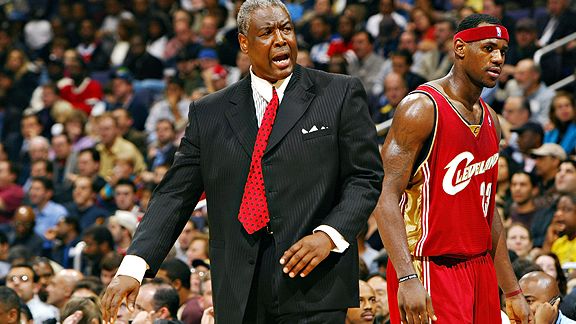 Doug Pensinger/Getty Images
Doug Pensinger/Getty ImagesSilas was fired as James' coach in Cleveland weeks after Dan Gilbert's 2005 arrival as owner.
Welcome to round #117 of "Henry sticks it to people who hate LeBron James!"
(Which is different than "Henry loves LeBron James." I point this out only because this point seems to be lost on so many commenters, Tweeters and e-mailers. My fascination is not with the player in the Heat uniform, but with the heat in the irrational hearts of any number of hoops fans.)
Paul Silas was James' first NBA coach, and of course now he's coaching the Charlotte Bobcats. Did you happen to see what Silas said about James on Monday? It's at the bottom of the AP game story:
Silas, fired by the Cavaliers in 2005, defended James from the criticism for announcing his free-agent decision on national TV. "I've been on buses where the general manager gets on the bus and tells a player he's traded. They don't let him know ahead of time," Silas said.
Silas is implying that the players and the management are on some kind of equal footing, like a marriage. And therefore, Silas implies, one of the things James has been most vilified for -- not notifying the Cavaliers of his decision before he told the world -- is no big deal, as teams do the reciprocal to players all the time.
I can hear some of you sputtering but that's the team. This is not a marriage. This is employer and employee, and the team is there in no small part to be in charge. They are the employers, the ownership, the management. The owner has paid a lot for the right to choose his employees, and the staff is there, by design, to make hard decisions, to set the course of the business, to take calculated risks, to think long-term. They require a certain leeway in handling such things, and can not be hauling players in for consultations on every little thing that might or might not happen. They have to worry about big things like economic trends, ticket sales and marketing campaigns.
Players, meanwhile, just have to play.
The reality, though, is we don't live in that world anymore. The reality is that it's hard to say who has the more complicated or impactful business decisions -- LeBron James or the Cavaliers, players or teams. As business entities, quite possibly James has more potential income, more global reach, more variables to consider, a more valuable name, and more at stake in especially when we talk about superstars.
James, as a business entity, may be bigger than the Cavaliers.
Which makes you wonder, why again would the Cavaliers require the right to huddle and decide big things in private, while the very best players are actually deciding things that are as big or bigger?
Does anybody doubt, for instance, that Michael Jordan is a more valuable business entity than his team, the Charlotte Bobcats, which employs Silas today? Because of his powers of endorsement and personality, and his sway in the media, a business like the Bobcats needs the endorsement and cash of someone like Jordan both to continue operating, and to matter to fans.
The same is true of the Cavaliers. They lost, essentially, one player, and have gone from title contention to having almost no chance of making the playoffs. James was the franchise, almost literally.
And considered that way, Silas is right to suggest that stars and teams ought to treat each other as some kind of equals. Teams and stars are in partnership, even though that reality is more complicated than the tidy world we used to live in where players played, owners owned and managers managed.
As I wrote on the night of The Decision, I think it was breaking that mold that many fans found most upsetting.
The players always drove the value, because they are what motivated the fans who paid for everything. It has taken decades, but eventually a player -- this player -- figured out how to really put himself in the driver's seat, with billionaire owners lining up, one by one, attempting to earn his valuable affections.
He took the power of free agency and instead of just quietly using it to slip out the back door, he milked it. He played it out. He built his own roster. He played kingmaker.
He went beyond exercising his rights. He demonstrated his might in the worlds of business, team management and media.
It's not a role we're used to seeing athletes in, and it startled many.
